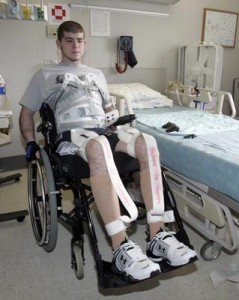PARALYZED LEGS:
Hello, my name is Xavi, and I will explain you my story. I was born in 9th of October 1990, and now I’m 25 years old. In June 13th I was an accident, with an accident of car because I didn't wear seatbelts, and my life was changed from that moment, what more I will accept it. Since this moment I’m not the same.
I’ve psychiatry trying to, every day, for help me, to live each day, because it has broken my future; I was a basketball player from NBA.
I’ve damaged me the spinal cord, and I had an operation but this didn’t so-lution my problem. Now I’ve the wheelchair.
Also I’m study in a university in EEUU, and the society help me with all, and they move me from class to class. Really, they give me someone helps
I need.
Muscle function loss is when a muscle doesn’t work or move normally. The medical term for de complete loss of muscle function paralysis.
There are an alternative names paralysis, paresis, loss of movement, motor dysfunction.
1. A disease of the muscle itself (myopathy).
2. A disease of the nervous system: nerve damage (neuropathy), spinal cord or nerve injury, or brain damage (stroke or other brain injury)
The loss of muscle function after these types of events can be severe. Often it will not completely return, even with treatment. Paralysis can be tempo-rary or permanent. It can affect a small area (localized) or be widespread (generalized). It may affect one side (unilateral) or both sides (bilateral). If the paralysis affects the lower half of the body and both legs it is called par-aplegia. If it affects both arms and legs, it is called quadriplegia. If the paral-ysis affects the muscles that cause breathing, it is quickly life-threatening.
NOTE: This is not a real situation. The objective of this blog is to investigate different disabilities and see the life from another point of view.
I need.

